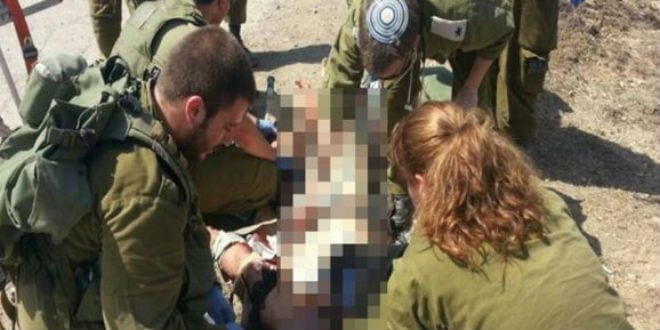According to medics in the IDF, mental anguish from the treatment of thousands of Syrians wounded from the fallout of the ongoing civil war is taking its toll.
For over two years, Israel has opened its door to wounded Syrians in need of medical care, incurring both the exorbitant financial cost of that care and the mental anguish suffered by civilian doctors and IDF medics who treat the wounded.
The almost daily occurrences of situations under which IDF medics are asked to respond to usually involve traumatic and stressful situations, placing great strain on the mental health of each soldier.
In a special exposé, Ynet gathered stories of the medical personnel who have been dealing with the horror, brutality and severity of treating injured Syrians over the last two years. Many of these soldiers are now receiving psychological treatment from mental health officers in the IDF.
A paramedic in the Golani brigade, who served in Operation Protective Edge and now serves in the Golan Heights, explained: “You can prepare yourself for combat like that in Operation Protective Edge, knowing that you have a limited number of ‘difficult days’. But in the Golan Heights, you face an unchanging reality of months. It’s not a war, but rather a crazy routine filled with anonymous wounded people and strangers, on almost a daily basis.”
“In several more months, when I’ll be a regular citizen, these nightmarish experiences with the wounded Syrians will claw at me at night to a far greater degree than the trials of the war in the summer,” he added.
Other soldiers made similar statements describing what is occurring in Syria as “institutionalized madness”.
“We had days so busy in which we were called to take in more and more wounded, that we barely had time to eat or drink,” a paratrooper stationed near the northern border recalled.
The medical soldiers face a daunting task in trying to treat the myriad number of wounded that come through to Israel on a daily basis from Israel’s warn torn enemy to the north. The injured often receive advance medical attention at an IDF base near the border after undergoing security checks to ascertain that they are not terrorists.
They are then transferred by ambulance to one of the four major northern hospitals in Israel – Poriya Hospital in Tiberias, Ziv Hospital in Safed, Rambam Hospital in Haifa or the Western Galilee Medical Center in Nahariya. The soldiers are not allowed to know the names of their patients due to security issues.
A female IDF paramedic serving on the northern front explained that some of the hardest cases to treat involve children.
“Some (of the patients) are children who you know were not involved in the any kind of fighting and arrive with a nearly-detached leg, or an elderly man who wasn’t treated for a week, whose hand is infected to the extent that you know that severing it is the only thing that will save his life,” she said.
Soldiers from the IDF’s Paratrooper Reconnaissance unit, who have been tasked with manning the border and transferring the wounded to Israel for the past year, have learned coping mechanisms to deal with the horror.

By using humor and having talks between commanders and soldiers following every instance of bringing in injured Syrians, the IDF is fostering an open environment that encourages emotional wellbeing.
“We follow procedure, according to which we conduct a discussion following each treatment given to a wounded person, we investigate the methods of treatment and draw conclusions, and also make sure the soldiers show no signs of post-traumatic stress disorder,” explained one of the soldiers.
In an extreme case, two Nahal Brigade soldiers have been honorably discharged from the IDF due to a deterioration of their mental health, caused by seeing the atrocities suffered by the Syrian refugees.
While the two Nahal soldiers were released upon their own request after witnessing what the army called “difficult scenes on the Syrian border” after providing emergency medical treatment to wounded Syrians, the IDF says that this is not a trend and that the IDF has learned from the experience.
According to IDF sources, the release of the two soldiers prompted IDF higher-ups to develop a plan to provide mental health care for soldiers who come into contact with traumatic situations caused by Syrian wounded.
“We are making many efforts in our implementation of the Magen (“Shield”) program for mental health, which includes preliminary intervention before the soldiers move on to operational duties.”
“As part of the preparations, we tell them what to expect and in general provide information about wounded Syrians,” the source added. “Mental health officers are working closely with officers and instructing them on how to detect signs of distress from soldiers and how to handle them. We don’t see the issue as a phenomenon.”
The IDF has refused to release the total number of injured Syrians treated by Israel. Moderate estimated put the number at several thousand. Over 1,000 have passed through the doors of the northern hospitals while many others are treated directly by the army before being released, having never made it to the hospital.




